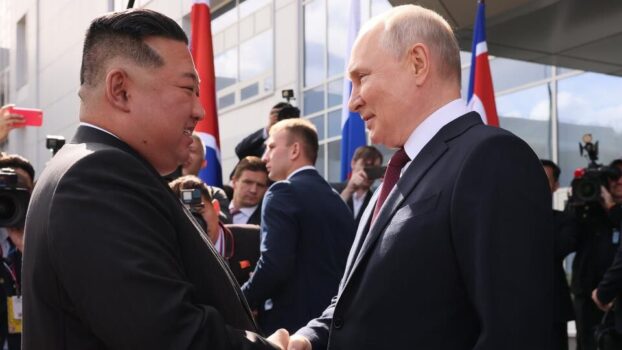 The Pentagon announced Monday that an estimated 10,000 North Korean troops have been sent to Russia and could enter combat against Ukraine “in the next several weeks,” marking a dramatic escalation in Pyongyang’s military intervention in the conflict.
The Pentagon announced Monday that an estimated 10,000 North Korean troops have been sent to Russia and could enter combat against Ukraine “in the next several weeks,” marking a dramatic escalation in Pyongyang’s military intervention in the conflict.
The figure represents a significant increase from the U.S. military’s initial estimate of 3,000 troops reported just last week. Pentagon spokesperson Sabrina Singh revealed that some forces have already moved closer to the Ukrainian border, raising concerns about an imminent deployment to the battlefield.
“We are increasingly concerned that Russia intends to use these soldiers in combat or to support combat operations against Ukrainian forces in Russia’s Kursk Oblast near the border with Ukraine,” Singh told reporters.
The deployment has drawn sharp criticism from Western allies and regional powers. NATO Secretary-General Mark Rutte characterized the move as “a significant escalation” and “a dangerous expansion of Russia’s war,” warning that the military cooperation between Russia and North Korea threatens both Indo-Pacific and Euro-Atlantic security.
South Korean President Yoon Suk-yeol condemned the “illegal” military cooperation between Russia and North Korea, stating it poses a threat to both his country’s national security and the international community. During a cabinet meeting, Yoon called for a thorough assessment of “all possibilities” and the preparation of countermeasures.
Moscow’s stance on the deployment has evolved from initial denials to measured acknowledgment. While Russian President Vladimir Putin has not explicitly confirmed the presence of North Korean troops, he characterized it as an internal matter related to implementing partnership treaties with Pyongyang.
Russian Foreign Minister Sergey Lavrov dismissed international concerns, pointing to a joint security pact signed with North Korea last June. He countered Western criticism by claiming that Western military instructors have been covertly operating in Ukraine to assist with long-range weapons.
The Pentagon made it clear that North Korean forces entering the conflict would face consequences. “If we see DPRK troops moving in towards the front lines, they are co-belligerents in the war,” Singh stated, adding that there would be “no limitations on the use of US-provided weapons on those forces.”
Ukrainian Foreign Minister Andrii Sybiha expressed frustration with the international response, saying Kyiv had been warning about the North Korean deployment for weeks. “The bottom line: listen to Ukraine. The solution: lift restrictions on our long-range strikes against Russia now,” he posted on social media.
U.S. Defense Secretary Lloyd Austin and Secretary of State Antony Blinken are scheduled to meet with their South Korean counterparts in Washington, DC later this week to discuss North Korea’s involvement in Ukraine. However, the U.S. has shown no indication it will approve Ukraine’s request to use American-provided weapons for deep strikes inside Russia.

Nguema Wins Gabon Presidential Election With Overwhelming Majority
Algeria Orders Expulsion Of French Diplomats, Raising Tensions With France
Suspected United States Strikes Kill Six In Yemen — Houthis
Trump’s Massive Tariffs Take Effect, Deepening Global Trade War